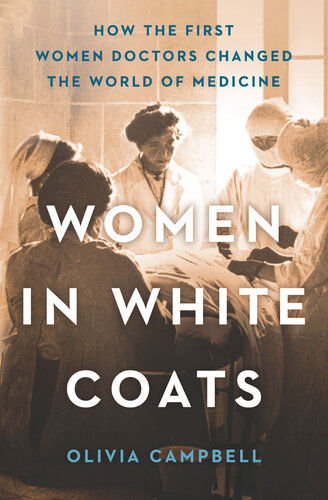
Women in White Coats
How the First Women Doctors Changed the World of Medicine
- اطلاعات
- نقد و بررسی
- دیدگاه کاربران
نقد و بررسی

November 23, 2020
Journalist Campbell debuts with an inspirational group portrait of the first three women who became licensed doctors in the U.S. and the U.K. Elizabeth Blackwell (1821–1910), the first woman to be accepted to an American medical school, got in because the male students who voted for her admittance thought her application was a joke. British physician Elizabeth Garrett Anderson (1836–1917) worked as a surgical nurse and studied with private tutors to pass the medical licensing exam, and cofounded the first hospital staffed by women. Sophia Jex-Blake (1840–1912) became the first practicing female doctor in Scotland. Though women had always served their communities and families as healers, Campbell writes, “when medicine began to be solidified as a profession... patriarchal control swept in.” She delves into her subjects’ love lives and family relationships; documents their battles against sexist school administrators and professors, including pioneering surgeon Joseph Lister; and notes their support for one another as well as their differences of opinion. At times, Campbell makes it sound as if her subjects were pledging a sorority rather than entering a profession, but her extensive research and lucid writing about medical matters impress. This entertaining account adds a valuable chapter to the history of women and medicine. Agent: Zoe Sandler, ICM Partners.

Starred review from February 1, 2021
Using her expert research skills, journalist Campbell writes about the academic journeys and personal lives of three trailblazing Victorian women in the medical profession: Elizabeth Blackwell, Lizzie Garrett, and Sophia Jex-Blake (with appearances from the rest of the Edinburgh Seven). Separately and together, the actions of these three women paved the way for equality for women in the medical field, both in the United States and in Europe. This is the story of how they all had to hold strong against family pressures to comply with societal behavioral norms, use their intelligence and networking connections, and harness persistence. Campbell's research follows an intricate paper trail that includes diaries, letters, and notes. The author hopes that future professionals can be inspired to continue to advocate for equal representation, as modern-day medicine is still affected by the remnants of patriarchal structures and attitudes. VERDICT The story of these trailblazing women and their unique achievements within the medical profession in the 19th century is well written and benefits from bountiful primary sources. It will be a great resource for further in-depth biographical studies. A highly recommended purchase for public library collections, and those that focus on health policy and women in STEM careers.--Elizabeth J. Eastwood, Los Alamos, NM
Copyright 2021 Library Journal, LLC Used with permission.

February 15, 2021
Veteran journalist Campbell knows how to use show-don't-tell details to chronicle the history of female physicians. Women now outnumber men in U.S. medical schools, but they couldn't even get into them in 1847. That first woman student, Elizabeth Blackwell, endured ridicule, but at least no one was trying to burn her at the stake, the fate of medieval women healers branded as witches. After she earned her MD, Elizabeth headed to Paris, the center of medical innovation, where she befriended Florence Nightingale and wound up with a glass eye that ended her dream of becoming a surgeon. Campbell also vividly portrays other pioneers, such as Lizzie Garrett (a "dainty, demure, dutiful wife and mother") and Sophia Jex-Blake ("an outspoken, heavy-set lesbian who struggled with a short temper"), who prevailed at a time when male doctors applied the word hysteria (from the Greek word for "uterus") to any woman whose condition eluded them. Nonetheless, women became the driving force behind medical advances, from X-rays to Pap smears, and today patients operated on by women physicians are less likely to die.
COPYRIGHT(2021) Booklist, ALL RIGHTS RESERVED.




دیدگاه کاربران